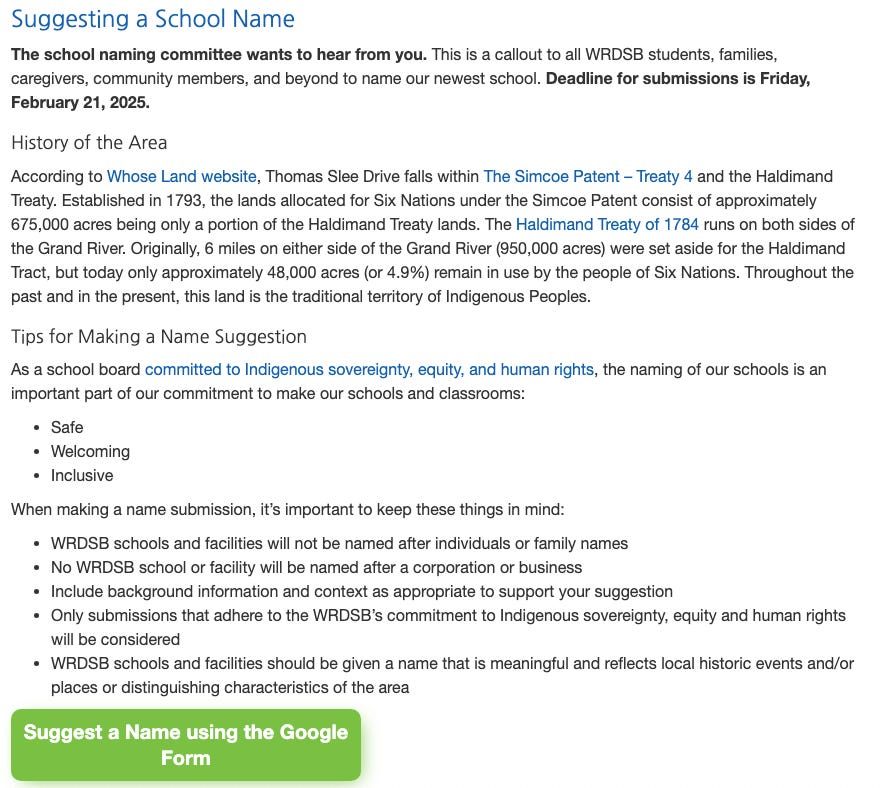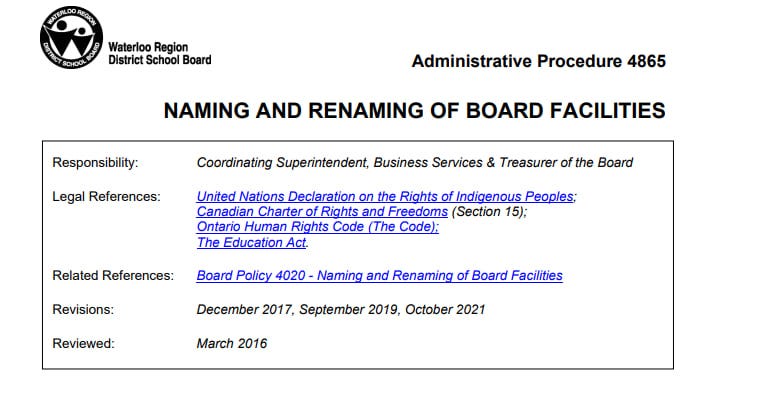WRDSB Wants Your Input—As Long As You Agree With Them
Community, or 'controlled' consultation? Does our voice only matter if it fits a particular political narrative?
In 1985, a full 78% of us reported feeling ‘very proud’ to be Canadian. According to the Angus Reid Institute, that number has dropped to 34% today. And this decline is most pronounced among young people across Western nations. In Britain, for instance, a recent poll suggests that only 11% of those aged 18-27 would fight to defend their homeland.
This demoralization would seem to originate from the ceaseless erasure and criticism of Western civilization throughout our education system. This includes, but is not limited to, removing the names of important historical figures from our schools.
And so it continues with a recent, seemingly harmless, announcement from the Waterloo Region District School Board (WRDSB) proclaiming that they want “Help Name[ing] Our New Southwest Kitchener Elementary School” set to open in September 2025.
“We know that our schools are integral parts of the communities we serve. As such, selecting a name for a school is an important first step in the ongoing relationship between the school, and those who learn, work and grow inside and out of the school.”
-WRDSB
And they’ve given us a whole ten days to reflect and submit our responses. That’s if you picked up on the announcement this last Tuesday.
Does the WRDSB even want to know what the parents and the people of Waterloo Region have to say about the decisions made for our publicly funded schools?
The Doon South & SW Kitchener, Have Your Say! questionnaire, states: “Please note: WRDSB schools cannot be named after individuals, corporations, or businesses.”
What an unusually specific diktat.
Schools are often named after individuals (currently 21 WRDSB schools)1 and never named after corporations or businesses (if you know of examples please let us know in the comments). This suggests that the actual intent is continued erasure of important historical figures (individuals), which is made more palatable to us mere mortals by the reasonable exclusion of businesses and corporations - because, who’s hung up on naming a school after a business or a corporation? A school IS a business. A school IS a corporation.
And what if the public wants the school named after an individual?
And where did this even come from? Is there some ‘rule’ with tyrannical criteria dictating a decision as welcoming and unifying as naming a publicly funded school?
The answer: Why, yes - yes there is.
Take a look at ‘Board Policy 4020: NAMING AND RENAMING OF BOARD FACILITIES'
Do you see now how so many—if not all—of the decisions made at these publicly funded corporations are driven by political agendas?
But do these policies change every time a new political party takes the stage? Or are they simply being pushed through faster than ever before? In 2019, the WRDSB AP 48652 indicated “historical names” as one of the criteria for naming a school. Recognizing those who have made “significant contributions to society in the district, province or country”.
As an X follower puts it:
Perhaps it will take a groundswell of the people—seeing the truth, naming it boldly, and refusing to be silent—to ignite the change we so desperately need.
Insert Margaret Mead (again):
"Never doubt that a small group of thoughtful, committed citizens can change the world; indeed, it's the only thing that ever has."
Some may want to advocate for names like Sir John A. Macdonald or A.R. Kaufman after only knowing that these WRDSB schools underwent a name change after the decision had already been made.
Come to think of it…
What kind of consultation was done to justify canceling these names, spending our tax dollars to rename the schools, and covering all the costs associated with that decision? (And how much did it cost?)
Does this truly represent the people of Waterloo Region?
Could the board be acting against our will - out of line with the public’s interests?
A policy prohibiting the use of an individual's name for a new school contradicts the stated goal of recognizing history, as it dismisses the contributions of those who have shaped our communities. If the objective is to honour the past, erasing individuals from recognition undermines that effort. This inconsistency is especially glaring when juxtaposed with Land Acknowledgments, which explicitly name historical groups and figures to validate their significance. Excluding individuals from school names while emphasizing historical recognition elsewhere suggests a selective and contradictory approach to acknowledging the past.
The very contentious policies that are being embedded in these schools are the ones many argue have turned our schools into what some now call ‘Indoctrination Centers’ or ‘Activist Training Grounds’.
The WRDSB announcement is deeply politicized, suggesting they have already settled on an Indigenous name. Their brief account of the area's history relies on Whose Land, a website that promotes Land Acknowledgments rather than providing a balanced historical perspective. This approach fosters grievance-driven narratives that divide rather than unite, prioritizing ideology over historical accuracy and national cohesion.
The announcement goes on to sternly pontificate that “[o]nly submissions that adhere to the WRDSB’s commitment to Indigenous sovereignty, equity and human rights will be considered.”
A quick search of the WRSB website for “Indigenous sovereignty” brings up former director Jeewan Chanicka’s strategic plan response, where he defines the term as follows:
In the WRDSB we accept that it is our responsibility to work towards Indigenous sovereignty – the right for Indigenous peoples, here on the part of Turtle Island we today call Canada, to have self-governance and determination. We must disrupt anti-Indigenous racism and Indigenous erasure so that First Nation, Métis, and Inuit students and families have a sense of success and belonging and we recognize that the challenge of achieving reconciliation is the challenge of our time. As Senator Murray Sinclair said, “education got us into this mess, and education will get us out of this mess.”
The concept of Indigenous sovereignty, as defined by the WRDSB, seems to suggest that Indigenous peoples should have their own country within something called “Turtle Island”. Whatever you think of this idea, it is obviously a very strong political position.
Where do such strong positions come from? Are harried parents—many of whom reasonably expect their WRDSB-educated children to graduate as thoughtful, literate citizens capable of articulating a range of political views on any issue—clamouring for schools to advocate for Indigenous sovereignty?
Almost certainly not. The onus ought to be on the WRDSB to prove it before it misappropriates public funds in its pursuit.
It's no wonder so many are choosing to leave. When education becomes about pushing a particular ideology rather than focusing on academic growth, critical thinking, and resilient character, it alienates those who want an environment that truly serves all students, not just a political agenda.
I find 5.3 and 5.4 fascinating—they essentially say: ‘Feel free to suggest names, but we’ll ignore them unless they align with our activist agenda.’ The WRDSB admits they don’t only have the authority to refuse requests, but if they choose, they can even label your request as "malicious or vexatious.” Heck, perhaps they’ll even write an open letter about it like they did with the Million Person March for Children, or in their response to the plethora of parental concerns coming forward regarding the sexualized material in our children’s schools. Is that all the evidence the WRDSB requires to back up their distorted claims as ‘accurate and true’ about the parents of the students who attend these schools?
I don’t know about you, fellow parents and citizens of Waterloo Region, but I refuse to accept tyrannical policies—especially in a publicly funded institution. Policies should serve the public, not control them. They should guide the governance of institutions, not govern the people who fund them.
So, Doon South & SW Kitchener, Have Your Say! - Truly. Tell WRDSB the name you want for your school, and make your voice heard on their policies. I would encourage all of the Waterloo Region, and beyond to do the same!
It’s time for publicly funded institutions to serve the public—not just use taxpayer dollars to push their personal and political initiatives.
Abraham Erb,
Edna Staebler,
Elizabeth Ziegler,
Howard Robertson,
J. F. Carmichael,
J. W. Gerth,
Janet Metcalfe,
Jean Steckle,
John Darling,
John Mahood,
King Edward,
Lester B. Pearson,
Mackenzie King,
Mary Johnston,
N. A. MacEachern,
Queen Elizabeth,
Sir Adam Beck,
W. T. Townshend,
William G. Davis,
Winston Churchill,
Jacob Hespeler
WRDSB Administrative Procedure 4865 with revisions made in October 2021, “reviewed March 2016” - perhaps it’s about time it’s ‘reviewed’ again - odd to make ‘revisions’ but not have it reviewed, no? [insert sigh]
]













I concede that it is bad policy to name a public space after somebody still living, but this has gone way overboard.